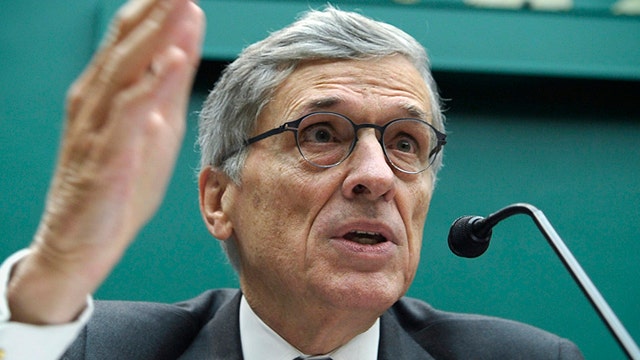This is a rush transcript from "Your World," February 11, 2015. This copy may not be in its final form and may be updated.
NEIL CAVUTO, HOST: Meanwhile, going online, you better go for your wallet. A new plan from the head of the Federal Communications Commission might create new Internet taxes and fees.
Now, the head of that commission says no, but it is creating headaches for this guy, something that Ajit Pai is not happy about at all. He's one of the FCC commissioners.
Sir, very good to have you.
AJIT PAI, COMMISSIONER, FEDERAL COMMUNICATIONS COMMISSION: Great to be here.
CAVUTO: As you know, the chairman has said that will not be the case, the fees will not go up. You argue, having gone through this whole 320- some-odd-page report, they likely will. Why?
PAI: Because, based on my review of this monstrous document, which I did review over the past several days, what I can tell you is that it represents a monumental shift towards government control of the Internet.
It is going to increase consumers' broadband bills, reduce their competitive options, create a haven for trial lawyers looking for class actions to file, and ultimately just harm the Internet ecosystem.
And that's part of the reason why I have called for this plan to be made public so that the American people can see it for themselves before the FCC votes on it.
CAVUTO: Now, Chairman Wheeler said -- and I guess he's the guy who decides this -- that it is not going to be made public. Has he given a reason why?
PAI: Well, what he says is that the traditional practice of the FCC is not to release these proposals before the FCC votes on it. And that's true for the run-of-the-mill items.
But this is anything other than a run-of-the-mill item. This is a massive issue that has consumed a great deal of public attention. Over four million people have commented. And, in an unprecedented fashion, the president of the United States himself directed the FCC in early November as to what he wanted the agency to do when it came to net neutrality.
And so if ever we were going to make an exception to the rule, it should be this one, because if you ask the average person on the street, do you think that the American people should see a 332 plan to regulate -- page plan to regulate the Internet before the FCC votes on it, they would say, of course. So do I.
CAVUTO: Well, but when you say net neutrality, I do want to stick syringes in my eye. But you're the expert.
But I guess what you fear -- and it's a justifiable fear -- I know where you're coming from -- that it would grant the FCC the authority to determine whether prices are just and reasonably then has the authority to address those areas where they're not just.
Now, the knee-jerk reaction to that would be, oh, OK this is too much a charge here. But you could as easily flip it around the other way, well, these people are getting away with murder here if we don't institute a charge, right? That's your fear?
PAI: Well, that is my fear, that rate regulation is something that we used to regulate the railroads in the 19th century, to regulate the Ma Bell in the 20th century.
CAVUTO: Right.
PAI: But the solution to the digital age is more competition, not more regulation.
This just takes us down a road that we have tried before in the past. And if we regulate the Internet economy as if it were a monopoly, a monopoly is what we're going to get. And that's not something I think anybody wants.
CAVUTO: But you would be for -- I mean, these guys, the Internet service providers who deliberately slow down traffic or stop service, because that stuff has gone on, might still go on, you wouldn't be against the government slapping them down when they try to pull that crap?
PAI: Well, to the contrary.
If you look at anything in this document, what you will see is that the FCC never identifies any systemic problem like that. There's a lot of hypotheticals...
(CROSSTALK)
CAVUTO: But it mentions it a lot. It mentions it, so it must be happening. Or am I just trusting the government too much?
PAI: I think you -- just wait until you get under the hood of this one.
CAVUTO: OK.
PAI: Because there are a few isolated examples that the document cites from 2005.
(CROSSTALK)
CAVUTO: But your fear is that we're going to be paying for a lot of stuff on the Internet, stuff we don't pay now, and that this is the Trojan horse gateway.
PAI: Not only that. You're going to be paying more, but the FCC is also going to micromanage even the service plans you have.
For example, the agency says that under a broad Internet conduct standard, they might outlaw, say, T-mobile's Music Freedom offering, which lets consumers stream music on to their smart devices without counting against their data caps. The agency might decide on a whim that that's a net neutrality violation.
You're letting -- telling the consumers what service plans they're allowed to have is not something I think the agency should be doing.
CAVUTO: All right. Commissioner, thank you very much...
PAI: Great to be with you.
CAVUTO: ... for steering us through this.
We appreciate it. All right.
Content and Programming Copyright 2015 Fox News Network, LLC. ALL RIGHTS RESERVED. Copyright 2015 CQ-Roll Call, Inc. All materials herein are protected by United States copyright law and may not be reproduced, distributed, transmitted, displayed, published or broadcast without the prior written permission of CQ-Roll Call. You may not alter or remove any trademark, copyright or other notice from copies of the content.






















